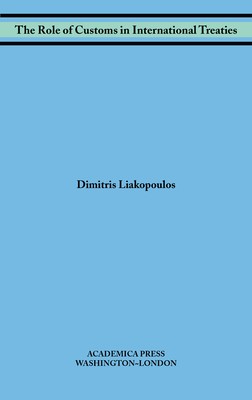
- We will send in 10–14 business days.
- Author: Dimitris Liakopoulos
- Publisher: Academica Press
- ISBN-10: 1680531352
- ISBN-13: 9781680531350
- Format: 15.2 x 22.9 x 2.1 cm, kieti viršeliai
- Language: English
- SAVE -10% with code: EXTRA
The Role of Customs in International Treaties (W. B. Sheridan Law Books) (e-book) (used book) | bookbook.eu
Reviews
Description
The Role of Customs in International Treaties concentrates on issues of friction between member states of the United Nations. In view of the role played by the United Nations in resolving international disputes, Dimitris Liakopoulos hypothesizes that "practical guides" based on custom often catalyze the positions taken by states, courts, scholars, and other actors, constituting an "orthodox" position against which formulaic legal opposition will become predictably more difficult. In addition to reiterating what some would say are obvious, on some particularly controversial issues, the United Nations has essentially chosen not to take a position and allowed customs to define conflict resolution.
EXTRA 10 % discount with code: EXTRA
The promotion ends in 22d.06:33:37
The discount code is valid when purchasing from 10 €. Discounts do not stack.
- Author: Dimitris Liakopoulos
- Publisher: Academica Press
- ISBN-10: 1680531352
- ISBN-13: 9781680531350
- Format: 15.2 x 22.9 x 2.1 cm, kieti viršeliai
- Language: English English
The Role of Customs in International Treaties concentrates on issues of friction between member states of the United Nations. In view of the role played by the United Nations in resolving international disputes, Dimitris Liakopoulos hypothesizes that "practical guides" based on custom often catalyze the positions taken by states, courts, scholars, and other actors, constituting an "orthodox" position against which formulaic legal opposition will become predictably more difficult. In addition to reiterating what some would say are obvious, on some particularly controversial issues, the United Nations has essentially chosen not to take a position and allowed customs to define conflict resolution.


Reviews